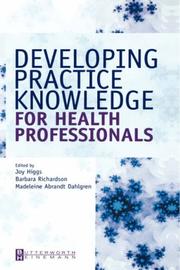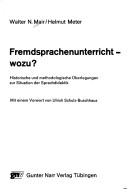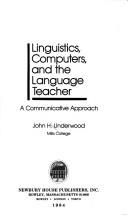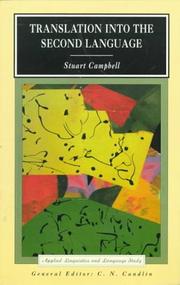| Listing 1 - 10 of 478 | << page >> |
Sort by
|

ISBN: 9780702038464 0702038466 0750654295 9780750654296 Year: 2004 Publisher: [Place of publication not identified] : Butterworth-Heinemann,
Abstract | Keywords | Export | Availability | Bookmark
 Loading...
Loading...Choose an application
- Reference Manager
- EndNote
- RefWorks (Direct export to RefWorks)
Health care professionals in the ever-changing world of contemporary medicine encounter challenges in the adequacy and capacity of their knowledge. This text explores these issues and helps the reader to develop their knowledge to meet the needs of the community. It provides a helpful reference to any kind of professional, whether from practice, education, or research backgrounds.
Human medicine --- Clinical competence --- Medical personnel --- Clinical Competence. --- Health Personnel. --- Clinical competence.

ISBN: 3878081510 9783878081517 Year: 1981 Volume: 151 Publisher: Tübingen: Narr,
Abstract | Keywords | Export | Availability | Bookmark
 Loading...
Loading...Choose an application
- Reference Manager
- EndNote
- RefWorks (Direct export to RefWorks)
Didactics of languages --- Philology --- Communicative competence --- Study and teaching --- -Communicative competence --- Competence, Communicative --- Communication --- Competence and performance (Linguistics) --- Psycholinguistics --- Communicative competence. --- Study and teaching. --- Philology - Study and teaching

ISBN: 0883774704 Year: 1984 Publisher: Rowley, Mass. Newbury House Publishers
Abstract | Keywords | Export | Availability | Bookmark
 Loading...
Loading...Choose an application
- Reference Manager
- EndNote
- RefWorks (Direct export to RefWorks)
Book
ISBN: 9780815350644 9780815350637 9781351142403 1351142399 9781351142380 1351142380 1351142402 9781351142373 1351142372 9781351142397 Year: 2021 Publisher: London : Routledge,
Abstract | Keywords | Export | Availability | Bookmark
 Loading...
Loading...Choose an application
- Reference Manager
- EndNote
- RefWorks (Direct export to RefWorks)
English language --- Communicative competence. --- Language and education. --- Education, Higher. --- Ability testing. --- Study and teaching --- Foreign speakers. --- Higher education --- Germanic languages --- Competence, Communicative --- Communication --- Competence and performance (Linguistics) --- Psycholinguistics
Multi
ISBN: 9781437711141 1437711146 9781416044857 141604485X Year: 2008 Publisher: Philadelphia : Saunders/Elsevier,
Abstract | Keywords | Export | Availability | Bookmark
 Loading...
Loading...Choose an application
- Reference Manager
- EndNote
- RefWorks (Direct export to RefWorks)
Human medicine --- Physicians' assistants. --- Clinical competence. --- Delivery of Health Care --- Physician Assistants --- Professional Role --- Clinical Competence --- methods --- Physician Assistants. --- Professional Role. --- Clinical Competence. --- methods.
Book
ISBN: 0838428819 Year: 1972 Publisher: Philadelphia, Pa Center for Curriculum Development
Abstract | Keywords | Export | Availability | Bookmark
 Loading...
Loading...Choose an application
- Reference Manager
- EndNote
- RefWorks (Direct export to RefWorks)
Didactics of languages --- Communicative competence. --- Languages, Modern --- Study and teaching.
Book
ISBN: 9782806101525 2806101522 Year: 2014 Volume: 2 Publisher: Louvain-la-Neuve: Academia,
Abstract | Keywords | Export | Availability | Bookmark
 Loading...
Loading...Choose an application
- Reference Manager
- EndNote
- RefWorks (Direct export to RefWorks)
Comment on se comprend. Questions de communication linguistique offre une introduction aux problèmes de la linguistique à partir d'une question simple : "Comment se fait-il qu'on se comprenne quand on se parle ?". Il ne concerne pas seulement un public de spécialistes, mais s'adresse à toute personne intéressée par les problèmes du langage, de la communication, de la pragmatique et de la cognition à un niveau académique.II suit une ligne historique en commençant par la linguistique historique du XIXe siècle jusqu'aux évolutions les plus récentes de la neurolinguistique et des grammaires de construction en passant par le structuralisme saussurien, la grammaire générative, la typologie et les écoles fonctionnelles et cognitives. Une large part est donnée aux apports de la philosophie du langage, de la théorie des actes de parole et de la pertinence, sans oublier les approches plus empiriques de l'analyse conversationnelle.L'auteur met l'accent sur l'évolution des questions que les linguistes se sont posées et dégage quelques principes de compréhension inférentielle des messages linguistiques qu'il illustre à travers une analyse de l'interprétation des phrases négatives.
Psycholinguistics --- Philosophy of language --- Communicatieve competentie --- Communicative competence --- Compétence de communication --- Communication orale --- --Linguistique --- --Communicative competence --- Competence and performance (Linguistics) --- Language --- Philosophy --- Language and languages --- Linguistique --- Philosophie du langage. --- Compétence de communication (linguistique). --- Discours (linguistique). --- Histoire. --- Compétence de communication (linguistique) --- Discours (linguistique) --- Language - Philosophy
Book
ISBN: 9789027256300 9789027273338 9027273332 9027256306 9781283895163 1283895161 Year: 2012 Publisher: Amsterdam/Philadelphia John Benjamins Pub. Co.
Abstract | Keywords | Export | Availability | Bookmark
 Loading...
Loading...Choose an application
- Reference Manager
- EndNote
- RefWorks (Direct export to RefWorks)
This paper presents a study of how teenage boys with learning disabilities evaluate co-participants' 'cognitive' or 'mental' state competences in interaction ("you are sick in the head"). The evaluations emerge out of disputes and disagreements about social experiences and end these disputes by excluding the co-participant from further talk on current topics. The study shows thus how 'mental' state evaluations become insults: In and through the use of 'mental' state evaluations in actions in which the boys triumph over, or 'win' the dispute as they exclude others from participation in on-going
Pragmatics --- Psycholinguistics --- Communicative competence --- Competence and performance (Linguistics) --- Conversation analysis --- Language, Psychology of --- Language and languages --- Psychology of language --- Speech --- Linguistics --- Psychology --- Thought and thinking --- Analysis of conversation --- CA (Interpersonal communication) --- Conversational analysis --- Oral communication --- Performance and competence (Linguistics) --- Creativity (Linguistics) --- Generative grammar --- Competence, Communicative --- Communication --- Psychological aspects --- Communicative competence. --- Conversation analysis. --- Psycholinguistics.

ISBN: 0582301882 9780582301887 9781315841144 9781317884972 9781317884989 9781138145146 Year: 1998 Publisher: London: Longman,
Abstract | Keywords | Export | Availability | Bookmark
 Loading...
Loading...Choose an application
- Reference Manager
- EndNote
- RefWorks (Direct export to RefWorks)
The dynamics of immigration, international commerce and the postcolonial world make it inevitable that much translation is done into a second language, despite the prevailing wisdom that translators should only work into their mother tongue. This book is the first study to explore the phenomenon of translation into a second language in a way that will interest applied linguists, translators and translation teachers, and ESOL teachers working with advanced level students. Rather than seeing translation into a second language as deficient output, this study adopts an interlanguage framework to consider L2 translation as the product of developing competence; learning to translate is seen as a special variety of second language acquisition. Through carefully worked case studies, separate components of translation competence are identified, among them the ability to create stylistically authentic texts in English, the ability to monitor and edit output, and the psychological attitudes that the translator brings to the task. While the case studies mainly deal with Arabic speakers undergoing translator training in Australia, the conclusions will have implications for translation into a second language, especially English, around the world. Translation into the Second Language is firmly grounded in empirical research, and in this regard it serves as a stimulus and a methodological guide for further research. It will be a valuable addition for advanced undergraduate and postgraduate students of applied linguistics, translation theory, bilingualism and second language acquisition as well as those involved in teaching or practicing translation at a professional level.
Translation science --- Sociolinguistics --- Translating and interpreting. --- Competence and performance (Linguistics) --- Traduction et interprétation --- Compétence et performance (Linguistique) --- #KVHA:Vertaalwetenschap --- Vertaalvaardigheid --- Vertalen --- didactiek --- Vertaalvaardigheid. --- didactiek. --- Traduction et interprétation --- Compétence et performance (Linguistique) --- Compétence et performance (linguistique) --- Traduction
Book
ISBN: 0044100027 Year: 1979 Publisher: London Allen & Unwin
Abstract | Keywords | Export | Availability | Bookmark
 Loading...
Loading...Choose an application
- Reference Manager
- EndNote
- RefWorks (Direct export to RefWorks)
Linguistics --- Generative grammar --- Competence and performance (Linguistics) --- Grammaire générative --- Compétence et performance (Linguistique) --- Chomsky, Noam --- Generative grammar. --- Competence and performance (Linguistics). --- Grammaire générative --- Compétence et performance (Linguistique) --- Chomsky, Noam.
| Listing 1 - 10 of 478 | << page >> |
Sort by
|

 Search
Search Feedback
Feedback About UniCat
About UniCat  Help
Help News
News